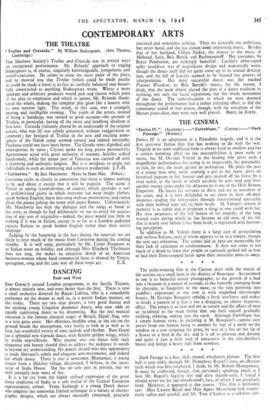CONTEMPORARY ARTS
THE THEATRE
THE Marlowe Society's Troilus and Cressida was in several ways an exceptional performance. Mr. Rylands' approach to staging Shakespeare is, of course, singularly knowledgeable, sympathetic and unself-conscious. He seems to sense the inner pulse of the plays, and he showed you that Troilus (which could be made patchy or could be made a bore) is in fact as carefully balanced and beauti- fully constructed as anything Shakespeare wrote. Where a more ignorant and arbitrary producer would pick and choose which parts of the play to emphasise and which to ignore, Mr. Rylands illumi- nated the whole, making the complete play glow like a lantern with its own interior light. The result, in this case, was a strangely moving and intelligible evening. The youth of the actors, instead of being a handicap, was turned to good account—the passion of Troilus, in particular, having all the misty and headlong idealism of first love. Cressida (valiantly played by an understudy of the original actress, who was ill) was calmly presented, without exaggeration or comment ; her betrayal of Troilus in the new and exciting atmo- sphere of the Greek camp seemed natural and indeed inevitable. Pandarus could not have been better. The Greeks were dignified and obstreperous by turns • Ulysses spoke his long pieces persuasively, Agamemnon acted with great authority of manner, Achilles sulked handsomely, while the minor part of Patroclus was carried off with a charming and authentic languor. But it is invidious to single out individuals in such an interesting and cohesive production. J. P.-H. Carissima." By Eric Maschwitz. Music by Hans May. (Palace.) Carissima sticks so closely to convention that there is almost nothing to be said about it except that it will be popular. The scene is Venice in spring (carnival-time, of course), which provides a sort of prefabricated gaiety in which everyone can wear bright clothes, speak broken English, burst into song without provocation, and canter' about the piazza pelting the tenor with paper flowers. Unfortunately Mr. Maschwitz has kept the dialogue and the songs as banal as the story, as though he had deliberately set out to avoid the accusa- tion of any sort of originality—indeed, the piece would lose little or nothing if it was in Italian, except in so far as a London audience expects Italians to speak broken English rather than their native language.
Judging by the humming in the bars during the intervals we are likely to hear much of the music from Carissima during the coming months. It is well sung, particularly by Mr. Lester Ferguson as an Italian tenor on holiday, and although Miss Elizabeth Theilmann does not sing, she makes an attractive sketch of an American business-woman whose hard commercial heart is thawed by Venice, springtime, song and the cute way all these wops act. C. E.






























 Previous page
Previous page